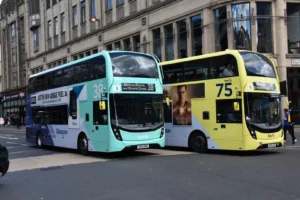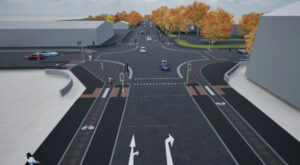Glasgow’s new transport strategy has reached the next phase of development as a final framework is set out covering more than 100 travel policies.
Following a year of consultation, the Glasgow Transport Strategy maps a route towards a network that aims to tackle poverty, fight climate change and create thriving neighbourhoods.
With vehicle emissions creating one third of the city’s carbon output and nearly 30% of car journeys being 1km or less, encouraging active travel is vital, reports Yahoo News.
Councillor Anna Richardson, City Convener for Sustainability and Carbon Reduction, said: “A great many trips in vehicles across the city are short and could realistically be achieved by other means.
“Our task as a council is to ensure there are viable alternatives that support walking, wheeling or cycling or public transport to help reduce car use. Cars and other private vehicles will clearly continue to be part of Glasgow’s transport future. But time and again people indicate they would cycle more if it felt safer to do so or the way that public spaces are designed can deter active travel in local communities.”
To support the city’s carbon reduction target, the new strategy sets out the ambition of reducing car vehicle kilometres travelled in Glasgow by at least 30% by 2030 and urging residents to walk or cycle instead.
As told in yesterday’s Glasgow Times, the Active Travel Strategy proposes to build a city-wide network of segregated cycle routes to support that aim.
Major projects such as the Clyde Metro, which recently received backing in the Scottish Government’s Strategic Transport Projects Review, and increased bus priority on roads are also key components in the effort to provide a world-class public transport network that draws people from their personal vehicles.
Cllr Richardson added: “Initiatives such as our Active Travel Strategy and our Liveable Neighbourhoods programme are all about creating a better balance on how Glasgow’s streets are used and encouraging people to leave the car behind wherever possible.
“Making in-roads on our car use is essential if we are to bring down the carbon emissions that drive climate change. But supporting sustainable transport choices also means we can make city streets safer and more attractive places to be, which in turns helps to improve quality of life for local residents. The new transport strategy fully recognises how important transport is to our daily lives and the overall success of the city.
“The far reaching policy objectives in the strategy create a vision of a healthy and thriving city but also a sustainable Glasgow that is prepared for the challenge of climate change.”
According to Department of Transport estimates, 1.70 billion vehicle miles were travelled in the Glasgow city area in 2020, a sharp drop caused by the pandemic.
Prior to covid, figures for 2019 show a peak of almost 2.250 billion vehicle miles per annum following steady growth in figures over the early part of the 21st century.
Around two-thirds of vehicle miles are travelled on trunk roads with a third on local roads.
The Scottish Government recently set a target of reducing car kilometres by 20% and other major cities such as London and Edinburgh have also similar ambitions.
The final policy framework of the Glasgow Transport Strategy will go before councillors at the Environment, Sustainability and Carbon Reduction Policy Committee on February 1.
























